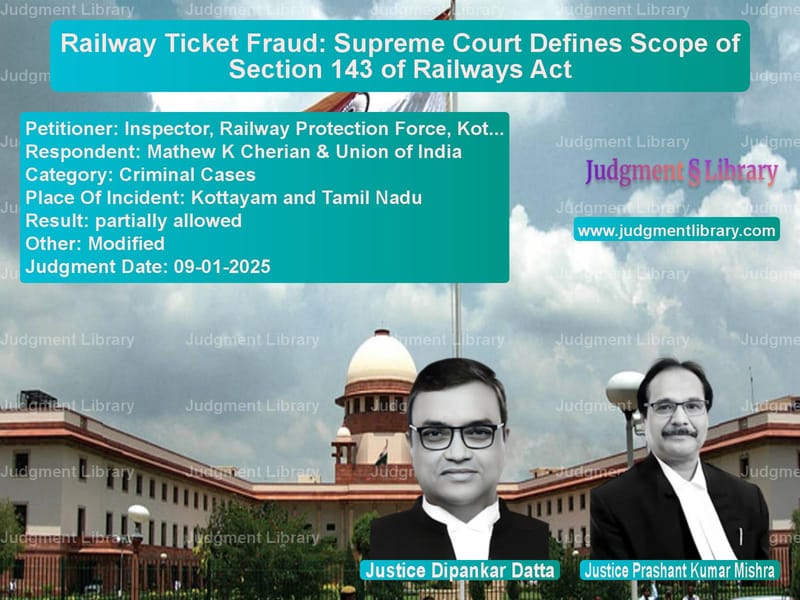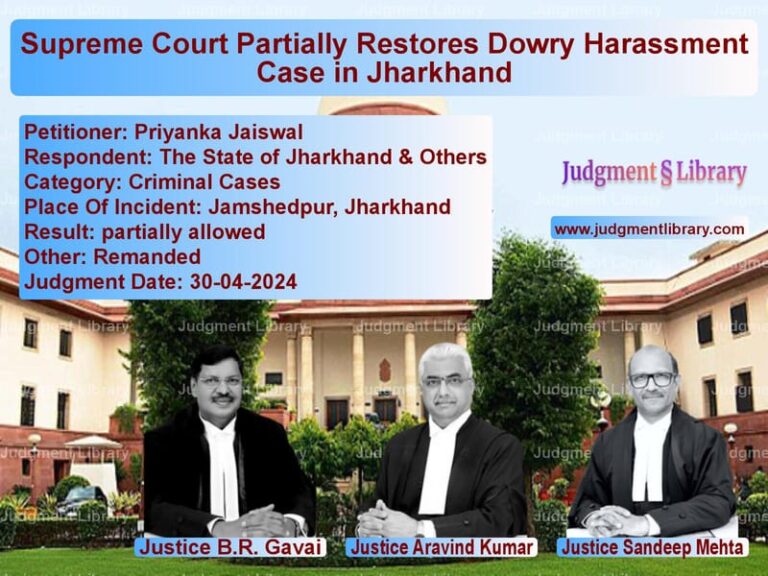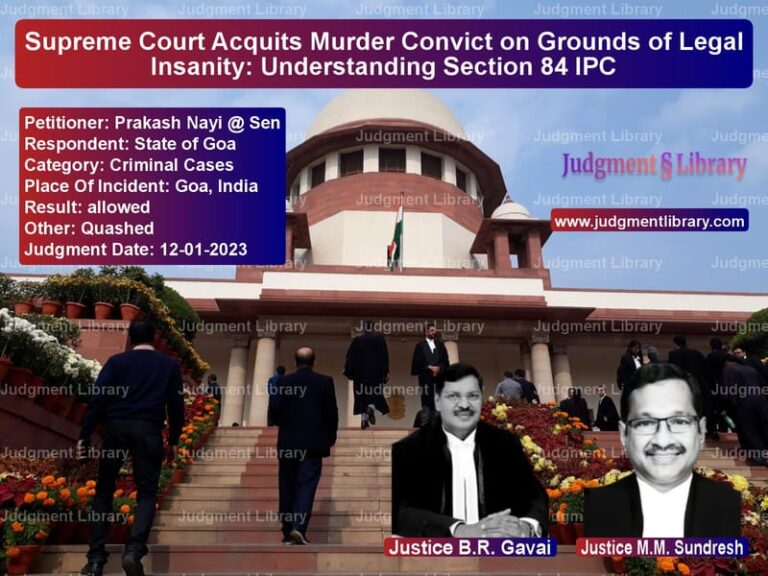Railway Ticket Fraud: Supreme Court Defines Scope of Section 143 of Railways Act
The recent judgment in the case of Inspector, Railway Protection Force, Kottayam vs. Mathew K Cherian & Anr. and J. Ramesh vs. Union of India has clarified the scope and application of Section 143 of the Railways Act, 1989. The Supreme Court addressed whether the unauthorized sale of railway e-tickets through multiple user IDs constitutes a criminal offense under the law. The Court’s ruling has significant implications for railway ticketing and enforcement against ticket touting.
Background of the Case
These appeals arose from separate cases in the Kerala High Court and the Madras High Court concerning allegations of illegal ticket sales. The prosecution alleged that the respondents were creating multiple user IDs and selling railway tickets through the Indian Railway Catering and Tourism Corporation (IRCTC) website without authorization.
In the first case, Mathew K Cherian, the Managing Director of Kosamattam Finance, was accused of operating an unauthorized railway ticketing business. He allegedly used fake user IDs to sell railway tickets at a premium. The Kerala High Court quashed the proceedings against him, ruling that the law did not explicitly criminalize online ticketing businesses.
In the second case, J. Ramesh, an authorized railway agent, was accused of creating multiple user IDs to facilitate ticket sales. Unlike Mathew, Ramesh was an officially recognized agent, and his case was different in that he operated within the railway’s authorized ticketing framework. The Madras High Court refused to quash the criminal proceedings against him.
Prosecution’s Arguments
- Section 143 of the Railways Act aims to prevent unauthorized railway ticket sales.
- Both physical and e-tickets fall under the purview of the law.
- Creating multiple user IDs to sell tickets at a premium violates the intent of the law.
- Allowing such practices would encourage large-scale ticket touting.
- The Kerala High Court’s ruling was flawed as it failed to recognize that the internet was merely a medium and did not change the nature of the crime.
Respondents’ Arguments
- Section 143 of the Railways Act predates the advent of online ticketing and does not explicitly criminalize e-ticket sales.
- Railway ticketing rules do not prohibit an authorized agent from using multiple user IDs.
- The Kerala High Court correctly interpreted the law to exclude online transactions.
- Ramesh, as an authorized agent, should not be prosecuted for violations that could be addressed through administrative or civil action.
Supreme Court’s Observations and Ruling
The Supreme Court carefully analyzed Section 143 of the Railways Act and emphasized the following points:
1. Unauthorized Ticketing Business:
The Court ruled that Section 143 clearly prohibits any person who is not a railway servant or an authorized agent from engaging in the business of procuring and supplying railway tickets. Mathew, not being an authorized agent, was engaging in illegal ticket sales and must face criminal proceedings.
2. Application to E-Tickets:
The Court held that the law applies equally to physical and e-tickets. The fact that the statute was enacted before the internet does not mean it cannot be applied to online ticket sales. The broad language of Section 143 covers all forms of unauthorized ticketing.
3. Strict Interpretation of Penal Laws:
The Court emphasized that while penal laws must be interpreted strictly, they must also be read in a way that upholds their purpose. Allowing individuals to exploit technological loopholes to engage in ticket touting would defeat the intent of the law.
4. Kerala High Court’s Error:
The Court disagreed with the Kerala High Court’s reasoning that online ticketing was beyond the scope of Section 143. It ruled that Mathew’s actions constituted a clear violation of the law.
5. Distinction Between Unauthorized and Authorized Agents:
Regarding Ramesh’s case, the Court found that as an authorized agent, he could not be prosecuted under Section 143. Any alleged violations of his contract with the railway should be addressed through administrative or civil proceedings, not criminal prosecution.
Conclusion and Final Order
The Supreme Court delivered the following verdicts:
- The Kerala High Court’s decision quashing proceedings against Mathew was overturned. Criminal proceedings against him were reinstated.
- The Madras High Court’s decision to allow criminal proceedings against Ramesh was overturned. The Court ruled that his case should be handled through non-criminal measures.
The ruling sets a clear precedent for future cases involving unauthorized railway ticket sales and affirms the importance of regulating online transactions in the railway sector.
Petitioner Name: Inspector, Railway Protection Force, Kottayam & J. Ramesh.Respondent Name: Mathew K Cherian & Union of India.Judgment By: Justice Dipankar Datta, Justice Prashant Kumar Mishra.Place Of Incident: Kottayam and Tamil Nadu.Judgment Date: 09-01-2025.
Don’t miss out on the full details! Download the complete judgment in PDF format below and gain valuable insights instantly!
Download Judgment: inspector,-railway-p-vs-mathew-k-cherian-&-u-supreme-court-of-india-judgment-dated-09-01-2025.pdf
Directly Download Judgment: Directly download this Judgment
See all petitions in Fraud and Forgery
See all petitions in Cyber Crimes
See all petitions in Judgment by Dipankar Datta
See all petitions in Judgment by Prashant Kumar Mishra
See all petitions in partially allowed
See all petitions in Modified
See all petitions in supreme court of India judgments January 2025
See all petitions in 2025 judgments
See all posts in Criminal Cases Category
See all allowed petitions in Criminal Cases Category
See all Dismissed petitions in Criminal Cases Category
See all partially allowed petitions in Criminal Cases Category







